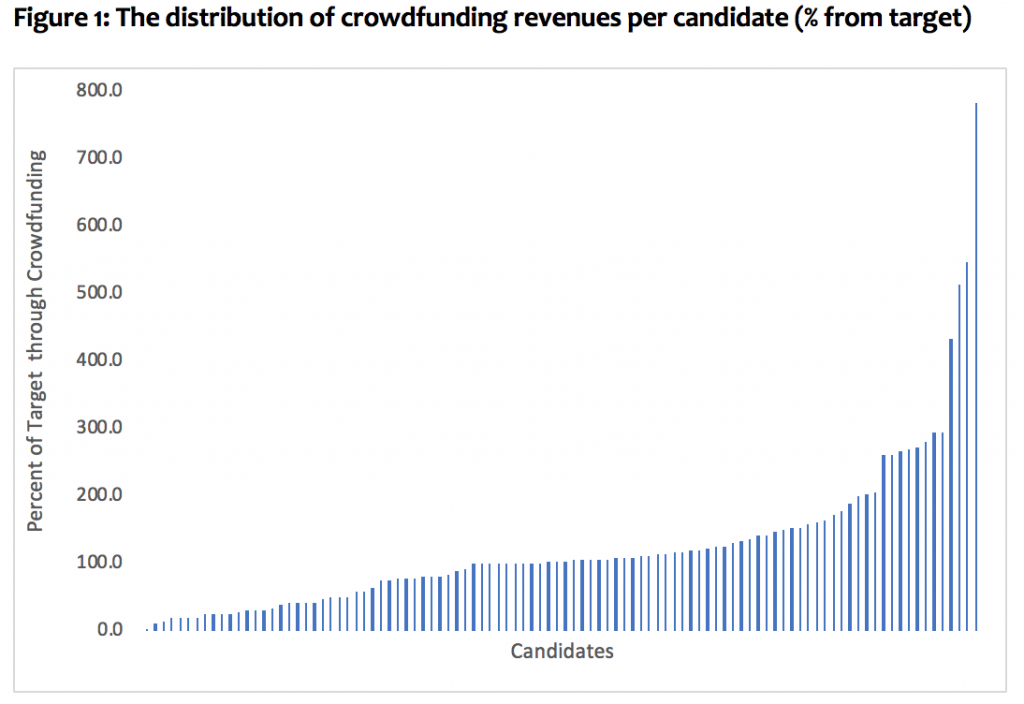
 Solange Pompl and Sergiu Gherghina analyse the use of crowdfunding in the 2017 general election campaign, in order to explain the variation in candidates’ ability to reach their targets. They find that candidates with an aggressive message, who are realistic about their proposed target, and who are already in office are more likely to gather donations closer to their targets.
Solange Pompl and Sergiu Gherghina analyse the use of crowdfunding in the 2017 general election campaign, in order to explain the variation in candidates’ ability to reach their targets. They find that candidates with an aggressive message, who are realistic about their proposed target, and who are already in office are more likely to gather donations closer to their targets.
The use of the internet in politics is important both for voters and politicians. Voters get extensive and timely information about what happens in the political arena, how their representatives perform in office, who the candidates are and what their strengths are, or how policies can influence their lives. Politicians make use of technology to convey their messages to a broad audience, to persuade about the importance of their issues, to fight political battles, and to ask for electoral and financial support. The latter is increasingly important in contemporary politics because it allows candidates to run more diverse and extensive campaigns.
Crowdfunding was originally used as a means of raising money for art, entrepreneurial, and humanitarian projects. The pros of crowdfunding projects are that they are shareable, accessible and they minimize dependency on large donations. Online crowdfunding now is one of the most recent avenues pursued by political candidates to gather small campaign donations. When looking at the crowdfunding campaign of Bernie Sanders in 2016 for example, it is clear what small donations can do.Crowdfunding is also a good method to create commitment for a political project. With every donation, politicians create a new ‘fan’, who feels committed to the end goal. This feature distinguishes crowdfunding from other types of online fundraising and is important to political candidates who strive for public support. Small donations are an indicator of one’s popularity and enhance competitiveness.
So far, little attention has been paid to this process although quite a number of candidates around the world have used it. In UK politics this process is particularly relevant because public funding is limited and confined to administrative costs, while the amount from membership fees declines as a result of a general loss of membership. Much of the cost for electoral campaigns is covered through private funding.
Our research identified what drives candidates to collect the amount set as a target at the beginning of the crowdfunding endeavour. We analysed 100 randomly selected crowdfunding projects of UK politicians running the 2017 General Election campaign who used Crowdfunder. More than half of the projects were fully funded (see Figure 1), with targets set by candidates ranging between £500 and £20,000. The platform has a couple of standard features: a title, project description, multimedia (a photo or video), funding target, links to social media, and updates on the funding progress. We analysed all these features and found that incumbency and negative messages increase the chances of reaching the projected funding target.
Incumbent politicians were overall more successful in reaching their crowdfunding target. Incumbents have a few advantages over challengers: more visibility (they are in the spotlight due to their earlier term in office), better access to resources, an existing base of supporters and connections with political actors and media outlets. Since the 2017 was a snap election, the challengers, especially those who were new candidates, had very little time to boost their public image and create a base of supporters. Through crowdfunding, incumbent candidates built on their advantages to collect the desired amount.
We also discovered that messages oriented against opponents bring more money to candidates. Candidates used different tactics to draw attention to their crowdfunding campaign. One possibility is the positive language to highlight their own skills, abilities or achievements. Another option is the negative language to denigrate opponents and reveal their weaknesses. A third avenue is a combination of the two and involves the comparison between candidates. To strengthen their own message and credibility, candidates refer negatively to other candidates. Earlier academic studies have argued that people find messages that include negativity more memorable because they trigger strong emotional responses. Such a mechanism works also in the case of crowdfunding and our analysis shows that candidates using more negativity in their messages turned out to be more successful in fundraising.
Our analysis also indicates that some factors do not matter for crowdfunding although one could expect to see an effect. For example, the use of social media to promote the crowdfunding campaign has no impact on the amount collected. In itself, this channel of advertising and communication is insufficient to produce results. Another example is that the success in crowdfunding cuts across parties and candidates are equally successful (or unsuccessful) independent of their affiliation.
Finally, we found no significant difference between candidates of different gender and from large and small constituencies although the former have in theory the advantage of a broader pool of donors.
These findings suggest that crowdfunding can be an important source of money in politics. More than half of the candidates included in our study reached their targets, which could be an incentive for candidates to seek small donations this way in the future. At the same time, our results indicate that office holders and negative messages are more appealing to donors. While this tells a similar story to voting behaviour, it can inform further strategies of crowdfunding in politics.
__________
Note: the above draws on the authors’ published work in Politics & Policy.
 Solange Pompl holds an MSc in Political Communication from the University of Glasgow. She currently works as an editor and project manager at the Parliamentary Documentation Centre in The Hague.
Solange Pompl holds an MSc in Political Communication from the University of Glasgow. She currently works as an editor and project manager at the Parliamentary Documentation Centre in The Hague.
 Sergiu Gherghina is Lecturer in Comparative Politics at the University of Glasgow.
Sergiu Gherghina is Lecturer in Comparative Politics at the University of Glasgow.
All articles posted on this blog give the views of the author(s), and not the position of LSE British Politics and Policy, nor of the London School of Economics and Political Science. Featured image credit: Pixabay (Public Domain).







